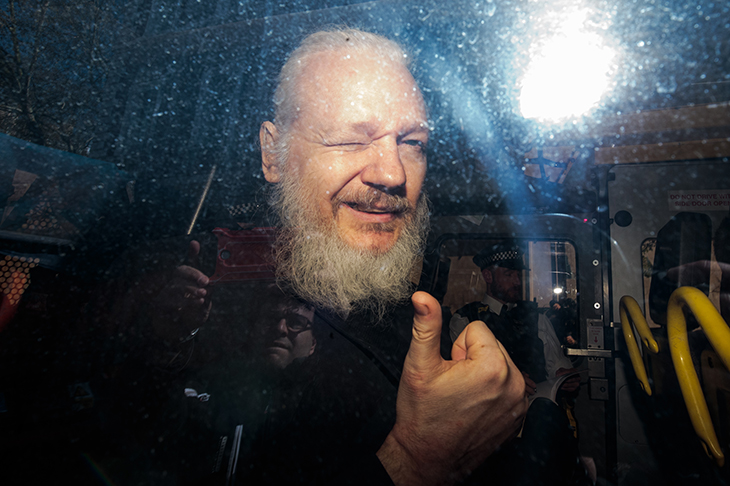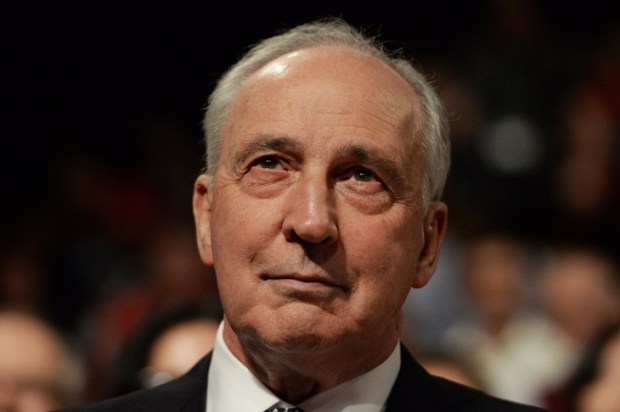If fish and visitors stink in three days, as Benjamin Franklin advised, it’s easy to see how Wikileaks founder Julian Assange was on the nose with his hosts after a seven-year sojourn in the Ecuadorian embassy in London. But Mr Assange arrives with an odour so fruity, we have been told, that it’s a wonder he was let in the door. And the revelations that have emerged since he was dragged out might be dubbed Whiffy-leaks.
Ecuadorian president Lenin Moreno withdrew Mr Assange’s asylum status not just for ‘repeated violations to international conventions’ — things like interfering in the internal affairs of friendly nations — but for violations of ‘daily-life protocols.’ Those violations are little things — like eating with his hands and wiping them on his trousers. ‘I have never seen pants as greasy as his in my whole life,’ marvelled one friend. Another warned that ‘unless the people around him force him into the shower, he might not change his clothes for days.’ That’s how he smelled, said Bill Keller, former executive editor of the New York Times, who wrote that at their first meeting he was as dishevelled as a bag lady, wearing dirty clothes, ‘beat-up sneakers and filthy white socks that collapsed around his ankles.’
When Mr Assange first became a fugitive from justice in the diplomatic mission, he was feted as a hero, appearing at an embassy balcony from time to time to pontificate. But as the years wore on, his welcome was as worn out as his footwear. Holed up with his computers and his conspiracy theories, in quarters hot enough to melt the Violet Crumbles sent by supporters, he took to late night skateboarding and didn’t deign to do the dishes, although his ghost writer said that he did lick his plates — Lickyleaks, anyone?
Eventually it fell to the President of Ecuador, in loco parentis, to nag him about tidying his room. So, in keeping with the zeitgeist, Mr Assange took Ecuador to court for violating his rights by making him pay for his internet and forcing him to clean up after his cat. In a small miracle for common sense, the Inter-American Commission on Human Rights and an Ecuadorian judge both ruled that cleaning up after yourself and your cat and paying your way did not represent a fundamental breach of human rights.
Once he was safely in British custody, Ecuador’s Interior Minister revealed that the man the Embassy staff dubbed ‘the guest’ was wont to daub ‘faeces on the walls of the embassy,’ an unusual way to show his gratitude to a country generous enough to offer him asylum. Assange’s lawyer denies the allegation, but nobody could call her client a paragon of personal hygiene.
Mr Assange also began to bug his hosts in other ways, as in bug their conversations with concealed listening devices to obtain information which he could use to ‘maintain his status’ presumably by blackmailing them about its threatened release. It can hardly have endeared him to them. But biting the hand that feeds him (along with licking his own) seems to be his forte; his ex-amigos include his collaborators at the NYT and the Guardian, his ghost writer, his closest associate at Wikileaks and the two Swedish women who welcomed him into their beds.
Mr Assange continues to be fawned on by celebrities and human rights lawyers, but the ranks of fans has thinned —his cat seems to elicit more concern in many quarters. It wasn’t always the case. When Wikileaks first shot to international notoriety it was for footage leaked by former US army intelligence analyst Chelsea (then Bradley) Manning, which showed a US Apache helicopter firing on a group of men armed with an AK47 and a rocketpropelled grenade. The footage was edited however to give the impression that the men were unarmed and titled ‘Collateral Murder.’ Subsequent leaks also undermined America and its allies. A dump of almost 100,000 documents related to the war in Afghanistan put in danger the lives of people cooperating with the Americans in fighting against the brutal and despotic Taliban.
Yet the Left hailed Mr Assange as a freedom fighter. The fact that he was accused of rape didn’t worry the cheer squad. Crowds never gathered outside the embassy of Ecuador chanting ‘Believe her!’ in the way that Judge Brett Kavanaugh was hounded.
It wasn’t until Wikileaks turned its sights on Hillary Clinton during her 2016 presidential campaign and started releasing emails that embarrassed her, that many on the Left denounced it as the ‘propaganda arm of the Kremlin doing Putin’s dirty work.’ In fact, Mr Assange’s Russian connection had been apparent for years. In 2012, he hosted a television show on Russia’s state-owned television network and anyone paying even cursory attention could see Wikileaks has never done a dump of classified Russian material. Indeed, Wikileaks, and President Putin, criticised the leaking of the Panama Papers; millions of financial documents, which exposed, amongst other things, the billions held in offshore accounts by all the President’s men.
Backflips abound on all sides. President Donald Trump denounced Wikileaks as disgraceful in 2010, and joked ‘Boy, I love reading those WikiLeaks’ in 2016. In reality, it’s as hard to love Wikileaks as it is to love Mr Assange. There is no doubt that there was real benefit in exposing some of the material — the Climategate emails showing how temperature data was manipulated; the Democratic National Campaign emails that shone a light on the way foreign funding is being used to try to shut down the Australian coal industry; the exposure of corruption in Tunisia which led to the peaceful democratisation of the country.
But there have also been horrific breaches of privacy endangering the lives of ordinary people. Wikileaks published private documents putting individuals at risk of identity theft and credit card fraud, and highly personal information that could be used against them such as accusations that a Saudi was homosexual or was not a virgin when she married. All this could have been avoided through careful curation.
Mr Assange is not the martyr for free speech that he claims to be; the US is seeking his extradition for trying to steal secrets, not for publishing them. Indeed, he faces a maximum jail sentence that is shorter than his self-imposed asylum. That only serves to highlight his cowardice in facing Western justice, in marked contrast to his insouciance as to the fate of those he exposed to mortal danger under truly tyrannical regimes. But given that the man seems never to have made his bed in his life, it is hardly surprising that he refuses to lie it in it.
Got something to add? Join the discussion and comment below.
Get 10 issues for just $10
Subscribe to The Spectator Australia today for the next 10 magazine issues, plus full online access, for just $10.
You might disagree with half of it, but you’ll enjoy reading all of it. Try your first month for free, then just $2 a week for the remainder of your first year.














Comments
Don't miss out
Join the conversation with other Spectator Australia readers. Subscribe to leave a comment.
SUBSCRIBEAlready a subscriber? Log in